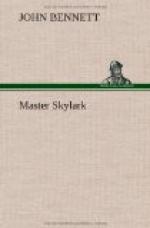He had been locked in for two days now. They had put in plenty of food, and he had eaten it all; for if he starved to death he would certainly never get home.
It was quite warm, and the boards had been taken from the window, so that there was plenty of light. The window faced the north, and in the night, wakened by some outcry in the street below, Nick had leaned his log-pillow against the wainscot, and, climbing up, looked out into the sky. It was clear, for a wonder, and the stars were very bright. The moon, like a smoky golden platter, rose behind the eastern towers of the town, and in the north hung the Great Wain pointing at the polar star.
Somewhere underneath those stars was Stratford. The throstles would be singing in the orchard there now, when the sun was low and the cool wind came up from the river with a little whispering in the lane. The purple-gray doves, too, would be cooing softly in the elms over the cottage gable. In fancy he heard the whistle of their wings as they flew. But all the sound that came in over the roofs of London town was a hollow murmur as from a kennel of surly hounds.
“Nick!—oh, Nick!”
Cicely Carew was calling at the door. The rat scurried off to its hole in the wall.
“What there, Nick! Art thou within?” Cicely called again; but Nick made no reply.
“Nick, dear Nick, art crying?”
“No,” said he; “I’m not.”
There was a short silence.
“Nick, I say, wilt thou be good if I open the door?”
“No.”
“Then I will open it anyway; thou durstn’t be bad to me!”
The bolts thumped, and then the heavy door swung slowly back.
“Why, where art thou?”
He was sitting in the corner behind the door.
“Here,” said he.
She came in, but he did not look up.
“Nick,” she asked earnestly, “why wilt thou be so bad, and try to run away from my father?”
“I hate thy father!” said he, and brought his fist down upon his knee.
“Hate him? Oh, Nick! Why?”
“If thou be asking whys,” said Nick, bitterly, “why did he steal me away from my mother?”
“Oh, surely, Nick, that cannot be true—no, no, it cannot be true. Thou hast forgotten, or thou hast slept too hard and had bad dreams. My father would not steal a pin. It was a nightmare. Doth thine head hurt thee?” She came over and stroked his forehead with her cool hand. She was a graceful child, and gentle in all her ways. “I am sorry thou dost not feel well, Nick. But my father will come presently, and he will heal thee soon. Don’t cry any more.”
“I’m not crying,” said Nick, stoutly, though as he spoke a tear ran down his cheek, and fell upon his hand.
“Then it is the roof leaks,” she said, looking up as if she had not seen his tear-blinded eyes. “But cheer up, Nick, and be a good boy—wilt thou not? ’Tis dinner-time, and thy new clothes have come; and thou art to come down now and try them on.”




